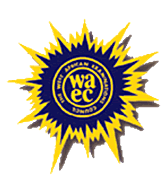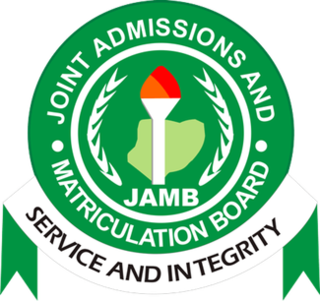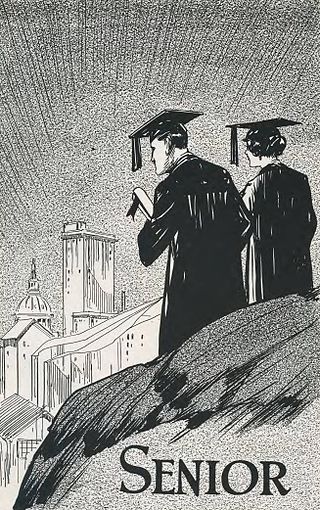The Secondary School Certificate (SSC) or Secondary School Leaving Certificate (SSLC), Matriculation examination, is a public examination in Bangladesh, India, Pakistan and Maldives conducted by educational boards for the successful completion of the secondary education exam in these countries. Students of 10th grade/class ten can appear in these. It is equivalent to the year 10 of the GCSE in England or the first two years of high schools in United States.
Queen's College, Lagos, is a government-owned girls' secondary (high) school with boarding facilities, situated in Yaba, Lagos, Nigeria. Often referred to as the "sister college" of King's College, Lagos, it was founded on October 10, 1927, when Nigeria was still a British colony.

The West African Examinations Council (WAEC) is an examination board established by law to determine the examinations required in the public interest in the English-speaking West African countries, to conduct the examinations and to award certificates comparable to those of equivalent examining authorities internationally. Established in 1952, the council has contributed to education in Anglophone countries of West Africa, with the number of examinations they have coordinated, and certificates they have issued. They also formed an endowment fund, to contribute to education in West Africa, through lectures and aid to those who cannot afford education. Since established it continues to be one of the biggest and most globally recognized exams in West Africa.

Education in Nigeria is overseen by the Federal Ministry of Education. The local authorities take responsibility for implementing state-controlled policy regarding public education and state schools. The education system is divided into Kindergarten, Primary education, Secondary education, and Tertiary education. Nigeria's federal government has been dominated by instability since declaring independence from Britain, and as a result, a unified set of education policies is yet to be successfully implemented. Regional differences in quality, curriculum, and funding characterize the education system in Nigeria. Currently, Nigeria possesses the largest population of out-of-school learning youths in the world. The educational systems in Nigeria are divided into two the public where the student only pays for Parents Teachers Association (PTA) while the private where students pay school fees and some other fees like sports, exam fees, computer fees etc. and they are costly
The West African Senior School Certificate Examination (WASSCE) is a type of standardized test in West Africa. Students who pass the exam receive a certificate confirming their graduation from secondary education. It is administered by the West African Examinations Council (WAEC). It is only offered to candidates residing in Anglophone West African countries. The academic school-leaving qualification awarded upon successful completion of the exams is the West African Senior School Certificate.

The Joint Admissions and Matriculation Board (JAMB) is a Nigerian entrance examination board for tertiary-level institutions. The board conducts entrance Unified Tertiary Matriculation Examination for prospective undergraduates into Nigerian universities. The board is also charged with the responsibility to administer similar examinations for applicants to Nigerian public and private monotechnics, polytechnics, and colleges of educations. All of these candidates must have obtained the West Africa Senior School Certificate (WASSCE) conducted yearly by the West African Examinations Council, WAEC, or its equivalent, National Examination Council (Nigeria), Senior School Certificate Examination, NECO SSCE.

The Federal Ministry of Education is a part of the Federal Ministries of Nigeria that directs education in Nigeria. It is located at Block 5A, Federal Secretariat Complex, Shehu Shagari Way, Central Area, P.M.B. 146, Garki, Abuja.

The A-level is a subject-based qualification conferred as part of the General Certificate of Education, as well as a school leaving qualification offered by the educational bodies in the United Kingdom and the educational authorities of British Crown dependencies to students completing secondary or pre-university education. They were introduced in England and Wales in 1951 to replace the Higher School Certificate. The A-level permits students to have potential access to a chosen university they applied to with UCAS points. They could be accepted into it should they meet the requirements of the university.

Rainbow College was founded in 1996 in Nigeria. It is located at km 39 Lagos/Ibadan expressway, Ogun State. It serves to prepare boys and girls for additional education either at a university in Nigeria or elsewhere in the world. It is a college that offers educational programmes for students of all nationalities.

The term senior, in regard to education, has different meanings depending on the country.

Kaduna State University is located in Kaduna, Kaduna State, Nigeria. It was established in 2004. It has seven faculties with over 39 departments and a library that contains over 17,000 volumes of books. It has two campuses: Kafanchan and Kaduna.
The Basic Education Certificate Examination (BECE) is the main examination to qualify students for admission into secondary and vocational schools in Ghana, and Nigeria. It is written after three years of junior secondary education. It is administered by the Ghana Education Service under the Ministry of Education. In Nigeria, it is administered by the state ministry of education in each state under the supervision of the National Examinations Council (NECO). NECO directly organizes examinations for Unity Schools, Armed Forces Secondary Schools, and other Federal Government schools. Candidates in the third year of junior high schools approved by the Ghana Education Service are eligible for the examination. It is conducted annually in June (Ghana and, May/June.
Dibu Ojerinde is a Nigerian professor of Tests and Measurement, educational administrator and a former Registrar of the Joint Admissions and Matriculation Board, JAMB.
University Press plc (UPPLC) is Nigeria's largest indigenous book publisher. It was founded as the Nigerian branch of the British Oxford University Press in 1949 with the name Oxford University Press (OUP), Nigeria. At incorporation as a public liability company in 1978, the company's name was changed to University Press Limited.
Anwar Ul-Islam Girls' High School was founded as the Anwar ul-Islam Movement's post primary institution for girls. It operates at two levels: Junior and Senior school as Day and Boarding school.
In Nigeria, the academic grading system scales from A to F (fail). Below is the grading system of Nigerian schools.
Godswill Ogbonnaya Obiomafnae fman fstan fcon fnatt fipma, was a Nigerian professor and the registrar of National Examination Council, NECO, until his death on 31 May 2021.
Abubakar M. Gana is the current director of the National Examinations Council (NECO) in Nigeria. NECO is a government agency responsible for the administration and supervision of various national and international examinations in Nigeria, including the Senior Secondary School Certificate Examination (SSSCE) and the National Common Entrance Examination (NCEE).
Examination Boards in Nigeria are organizations that are given the mandate to conduct placement examinations in form of learning assessment for Nigerian students. This assessment aims at admitting the students into different institutions of learning at different levels of the Nigerian educational system. The major educational boards in Nigeria are Joint Admissions and Matriculation Board (JAMB), National Examination Council (NECO), West African Examination Council (WAEC) and the National Business and Technical Examination Board (NABTEB), Others include International General Certificate of Secondary Education (IGCSE). The National Board for Educational Measurement is a professional organization which oversees the assessment processes to ensure that the assessment process is just. It is an organization which checks the activities of the examination boards. This body also is involved in educational measurement by measuring how standardized tests are and the viability of performance-based assessments. Thay also help the Nigerian examination boards in assessment design and implementation.








